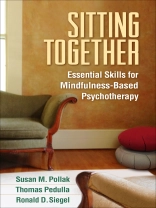This practical guide helps therapists from virtually any specialty or theoretical orientation choose and adapt mindfulness practices most likely to be effective with particular patients, while avoiding those that are contraindicated. The authors provide a wide range of meditations that build the core skills of focused attention, mindfulness, and compassionate acceptance. Vivid clinical examples show how to weave the practices into therapy, tailor them to each patient’s needs, and overcome obstacles. Therapists also learn how developing their own mindfulness practice can enhance therapeutic relationships and personal well-being. The Appendix offers recommendations for working with specific clinical problems. Free audio downloads (narrated by the authors) and accompanying patient handouts for selected meditations from the book are available at
www.sittingtogether.com.
See also
Mindfulness and Psychotherapy, Second Edition, edited by Christopher K. Germer, Ronald D. Siegel, and Paul R. Fulton, which reviews the research on therapeutic applications of mindfulness and delves into treatment of specific clinical problems.
Inhoudsopgave
1. Bringing Mindfulness into Psychotherapy
2. Becoming a Mindful Therapist
3. Cultivating Mindfulness in the Therapeutic Relationship
4. Concentration Practice: Focusing the Mind
5. Open Monitoring: Expanding the Mind
6. Loving-Kindness and Compassion Practice: Engaging the Heart
7. Equanimity Practice: Finding Balance
8. Making Mindfulness Accessible
9. The Art of Sequencing
10. Beyond Symptom Relief: Deepening Mindfulness
Appendix. Selecting Practices
Resources
Over de auteur
Susan M. Pollak, MTS, Ed D, is cofounder and senior teacher at the Center for Mindfulness and Compassion at Harvard Medical School/Cambridge Health Alliance, where she has supervised and taught since the mid-1990s. She is past president of the Institute for Meditation and Psychotherapy and a psychologist in private practice in Cambridge, Massachusetts. A longtime student of meditation and yoga, Dr. Pollak teaches about mindfulness, compassion, and self-compassion in psychotherapy and has been integrating the practices of meditation into psychotherapy since the 1980s. She is author of
Self-Compassion for Parents (for general readers) and coauthor of
Sitting Together: Essential Skills for Mindfulness-Based Psychotherapy (for mental health professionals).
Thomas Pedulla, LICSW, is a clinical social worker and psychotherapist in private practice in Arlington, Massachusetts, where he works with individuals and leads mindfulness-based cognitive therapy groups. A faculty and board member at the Institute for Meditation and Psychotherapy since 2007, Mr. Pedulla has also served on the board of the Cambridge Insight Meditation Center and has been a practitioner of meditation in the vipassana tradition since the 1980s.
Ronald D. Siegel, Psy D, is Assistant Professor of Psychology, part time, at Harvard Medical School/Cambridge Health Alliance, where he has taught since the early 1980s. He is a longtime student of mindfulness meditation and is a faculty and board member at the Institute for Meditation and Psychotherapy. Dr. Siegel teaches internationally about the application of mindfulness practices in psychotherapy and other fields, and maintains a private practice in Lincoln, Massachusetts. His books include
The Mindfulness Solution, for general readers, as well as several acclaimed works for professionals.












